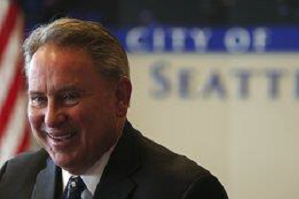02 Mar Despite opposition, Seattle City Light nominee Larry Weis is a good fit
Larry Weis, Seattle Mayor Ed Murray’s nominee to become the next CEO and general manager of Seattle City Light, pictured on Nov. 18 in Seattle (Ken Lambert/The Seattle Times). The Seattle City Council should confirm Larry Weis for the top job at Seattle City Light.
By Dave Gering, Special to The Times
 THINK globally, act locally. Seattle is home to many who translate global concerns into local action. But the strategy takes a wrong turn in criticism of Larry Weis, Mayor Ed Murray’s nominee to run Seattle City Light.
THINK globally, act locally. Seattle is home to many who translate global concerns into local action. But the strategy takes a wrong turn in criticism of Larry Weis, Mayor Ed Murray’s nominee to run Seattle City Light.
Some Seattle activists say Weis is too committed to fossil fuels, a criticism that focuses on his support for constructing a new natural gas plant in his previous job as utility director in Austin, Texas.
But the potential gas plant is part of a 10-year plan in Austin to make “historic commitments to solar power and other forms of renewable energy” and “phase out the city’s oldest and most polluting fossil-fuel plants — the Decker natural gas plant and Fayette coal plant.”
The Austin plan will “be among the most ambitious, environmentally and fiscally responsible (energy) generation plans in the nation.”
The quotes above come from the Lone Star Chapter of the Sierra Club, which created the plan along with other environmental groups, the Austin City Council — and Weis at Austin Energy. The plan provides for a new gas plant that might be required to achieve Austin’s carbon-reduction goals by replacing the old coal and gas plants.
As in Seattle, some in Austin argue against continued use of fossil fuels, but the Austin community adopted a plan that aligned its global goals with local realities. The Seattle City Council should do the same and vote to confirm Weis as utility superintendent.
Globally or locally, Seattle’s greatest green asset is the low-carbon, renewable hydroelectricity that provides 90 percent of our baseload power. (Austin, by contrast, hopes to someday get 55 percent of its baseload power from renewables.)
Hydropower lights, heats and cools our homes and workplaces. It fuels our public services. It also drives an industrial job base that is one of the largest export production centers in the United States, with a green-energy resource supporting 80,000 blue-collar jobs inside the city limits and about 100,000 more within a half-hour drive of the Space Needle.
This combination of a green-energy resource and blue-collar jobs brings a major social opportunity. As baby boomers begin to retire, a new generation of workers must be found to replace them.
Imagine a green, renewable power base for a well-paid job base with lots of career opportunities.
It is an inspiring, realistic vision. To fulfill it, we need to maintain and enhance our hydroelectric system. Weis brings decades of hydro experience based on his work with hydro systems for Snohomish County and the Pend Oreille Public Utility District north of Spokane before his time in Austin. Global or national agendas should not fog local realities. The civic risk of doing so was raised in a recent Danny Westneat column in The Seattle Times about a new survey of American cities by The Atlantic Monthly.
In a three-year study of nearly 50 mid-sized cities, Atlantic national correspondent James Fallows found successful communities are focused politically “not on national divisions, but on practical problems that a community could address. The more often national politics came into local discussions, the worse shape the town was in.”
Like other successful communities, Seattle works best when national agendas are aligned with local realities. City Light would work well with Weis as its CEO.
Dave Gering is the executive director of the Manufacturing Industrial Council of Seattle.
